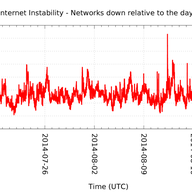
512K-mageddon?
• 6 min read
A week after the 512K-routes problem started making waves, we took a look at the global effects to see what impact it had. Spoiler: Not much.

Based in Amsterdam, NL
Articles
Likes on articles

I'm a data scientist at the RIPE NCC. I'm a chemist by training, but have been working since 1998 on Internet related things, as a sysadmin, security consultant, web developer and researcher. I am interested in technology changes (like IPv6 deployment), Internet measurement, data analysis, data visualisation, sustainability and security. I'd like to bring research and operations closer together, ie. do research that is operationally relevant. When I'm not working I like to make music (electric guitar, bass and drums), do sports (swimming, (inline) skating, bouldering, soccer), and try to be a good parent.

• 6 min read
A week after the 512K-routes problem started making waves, we took a look at the global effects to see what impact it had. Spoiler: Not much.
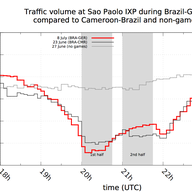
• 25 min read
The World Cup is one of the most watched events on the planet, and we've been looking at traffic changes at Internet Exchange Points during the matches in Brazil at World Cup 2014. The final part of our analysis is now available, with a look at what happened during the final four matches of the tou…
Article tags:
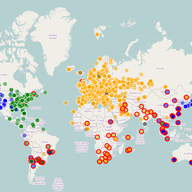
• 6 min read
Engineers from the Wikimedia Foundation and the RIPE NCC recently collaborated on a project to measure the latency of Wikimedia sites for users worldwide. Together, we identified ways to decrease latency and improve performance for users around the world.

• 5 min read
In RIPE Atlas we see latencies to Google's 8.8.8.8 DNS resolver service drop in Turkey. We expect this is due to hijacking of the 8.8.8.8 service. Our measurements show a timeline of these events. Note that even when the Twitter ban had been lifted, RIPE Atlas still saw fake 8.8.8.8 DNS service…
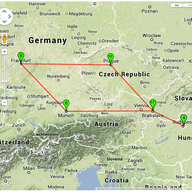
• 7 min read
At RIPE 67 we presented our ideas on infrastructure geolocation. We received positive feedback for developing this idea. This article shows the current thinking on how to develop router geolocation further. Any feedback will be appreciated.

• 12 min read
As one of the strongest typhoons on record, Haiyan is feared to have a devastating effect on the Philippines. We looked for evidence of its effects on the country's core Internet infrastructure. At first glance, the typhoon's impact on core Internet infrastructure appears to be modest. This is in …
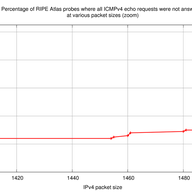
• 15 min read
This new RIPE Labs article talks about trying to send large packets over the Internet. Above a certain size, these packets will have to be fragmented, which is known to cause problems. In both IPv4 and IPv6, we see approximately 10% of RIPE Atlas probes that are unsuccessful in pings with fragmente…

• 5 min read
Significant Internet disruptions are happening in Sudan, possibly as a reaction to riots. We use RIPE NCC tools to get a better understanding of what is going on.

• 5 min read
This article provides statistics about how much IPv4 address space is being announced by networks (ASNs) that are also announcing IPv6 address space. Currently this is about 70% of IPv4 address space.
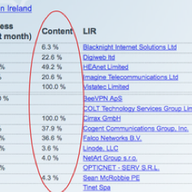
• 8 min read
In this article we present the first publicly available beta version of the fifth IPv6 RIPEness star. This measures real IPv6 deployment from LIRs in the RIPE NCC service region. The methodology is what we think to be the best compromise yet between simple and fair. In this first version, 573 LIRs …
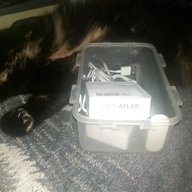
• 8 min read
This article is intended to make RIPE Atlas users aware of ethical issues that could arise when using RIPE Atlas. We do not intend to propose any new formal processes or procedures to address the relevant ethical issues, but we do want to encourage members of the RIPE Atlas community to consider th…
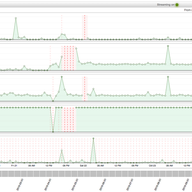
• 6 min read
We used a number of RIPE NCC tools and data sets to take a quick look at the recent DDoS attack on Dyn’s infrastructure. We wanted to see if this could be found in the data produced by the RIPE Atlas community.

• 11 min read
The issue of the relative sizes of the IPv4 and IPv6 Internet in BGP came up during discussion at the APNIC/APRICOT meeting held in Auckland, New Zealand earlier this year.
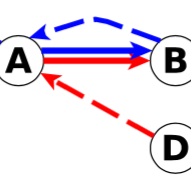
• 8 min read
Detecting network disruptions is a recurring problem. Clearly locating performance degradation is an important step in debugging and subsequently fixing connectivity issues.
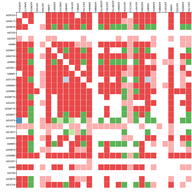
• 4 min read
The IXP country jedi tool described in earlier RIPE Labs articles, can also be used to analyse the situation in a specific city. This time we look at Berlin.
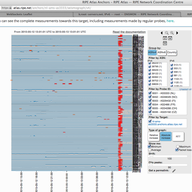
• 3 min read
During the RIPE 70 Meeting in Amsterdam this week (on 13 May around 10:00 UTC), we experienced a network outage at AMS-IX. Let's see how this was monitored by various tools.

• 9 min read
In 2013 and 2014 we looked into measuring Interdomain Routing in Africa using the RIPE Atlas infrastructure. This resulted in a paper published at the PAM (Passive and Active Measurement) 2015 conference. Here we present some highlights of this research.
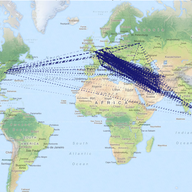
• 9 min read
With the MENOG 15 meeting taking place this week, we look at Internet measurements and statistics for countries in the MENOG region.
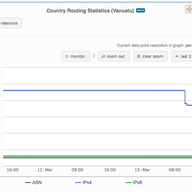
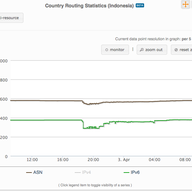
• 5 min read
In this article we are looking in some more detail at BGP leak in Indonesia and illustrate how RIPEstat visualisations can help to assess the impact.
“One may assume that, if some people delayed the changes, other people rushed in to adapt the networks to the increased load? Both behaviour may explain why the change rate is more or less the same?”
I think it would be interesting to dig into this data deeper indeed. I looked at splitting this out per country a bit, but could try figure out if there are trends in the sets of ASNs in this timeseries. Would you be willing to look at this? My colleague Vesna is doing a virtual hackathon around Internet and Corona ( https://labs.ripe.net/Members/becha/hackathons-in-the-time-of-corona ), I'd love it if we could collaborate around this. Let me or Vesna know, or hop on to the conf calls, Mon 2pm UTC ( 3pm Paris timezone :) )
“Ghost routes: https://www.sixxs.net/tools/grh/what/”
I've added a reference to the different names 'stuck routes' and 'ghost routes' for this phenomenon at the beginning of the post. Thanks for the pointer!
“Interested in repeating this analysis for 2018 world cup?”
Hi Dan, we have no plans of repeating this analysis this time. This type of signal is still there, see for instance https://twitter.com/search?q=%40ohohlfeld%20%23worldcup&src=typd for a couple of graphs that show the impact in various places.
“@emileaben Rather than standardizing human-readable output format, why not emitting a standard structured format, separating the network part (traceroute) and the visualisation part (a tool using the structured output format). Such a format already exists, in RFC 5388. I let you do the same in JSON :-)”
thanks for the interest in the topic Stephane. You hit the nail on the head, the main idea was to standardise a structured format for traceroute. I notice a lack of enthusiasm for RFC5388, probably due to it's verbosity. quick test shows that gzip compression of RFC5388-style results would need 3x more storage relative to plain-text traceroute results. But the RFC is likely very useful to see if we cover all bases in a slimmer structured output format.
One other activity that may be worth mentioning here: We organised a get-together for traceroute implementers. As many traceroute implementations do things slightly different, a bit more coordination can help in making things more consistent, for instance in output formats.
“I'm trying to work with the ixp-jedi tool. In this step: ## measure.py This script runs one-off measurements for the probes specified in _probeset.json_ and stores their results in _measurementset.json_ This uses the RIPE Atlas measurement API for measurement creation, And it needs a valid measurement creation API key in ~ / .atlas / auth When trying to execute the script ./measure.py I get the following and I do not know how to solve it. Authentication file /root/.atlas/auth not found Please, I need your help.”
hi, thanks for trying to use the tool. i hope the docs on github are clear enough: https://github.com/emileaben/ixp-country-jedi/#measurepy --- This script runs one-off measurements for the probes specified in probeset.json and stores their results in measurementset.json This uses the RIPE Atlas measurement API for measurement creation, and it needs a valid measurement creation API key in ~/.atlas/auth . For more information on RIPE Atlas API keys see https://atlas.ripe.net/docs/keys/ --- if not let me know how to improve that. if you are interested in country-level monthy runs. these are available at: http://sg-pub.ripe.net/emile/ixp-country-jedi/history/
“Hi, Is there a way to download multiple days dataset without having to do them individually? Also do you have any API's which will permit me to download the datasets using wget?”
Hi Meenakshi, I think you'll have to download the files individually. I think, if your RIPE Access account doesn't have 2 factor authentication, you can use wget to download the files with the --user and --password options.
While we were busy pushing this post out, it looks like the Gambian Internet was restored, roughly around 12h UTC on 2 December. RIPE Atlas probes came online again, and we see 6 out of 7 ASNs in RIS data again.
Showing 18 comment(s)